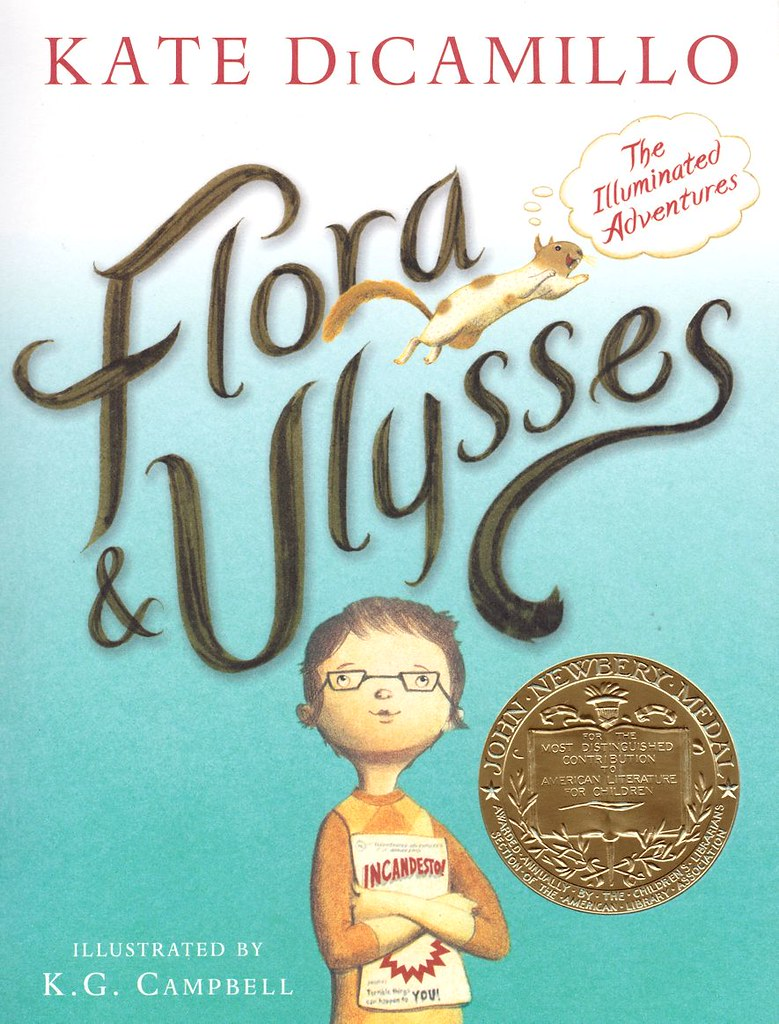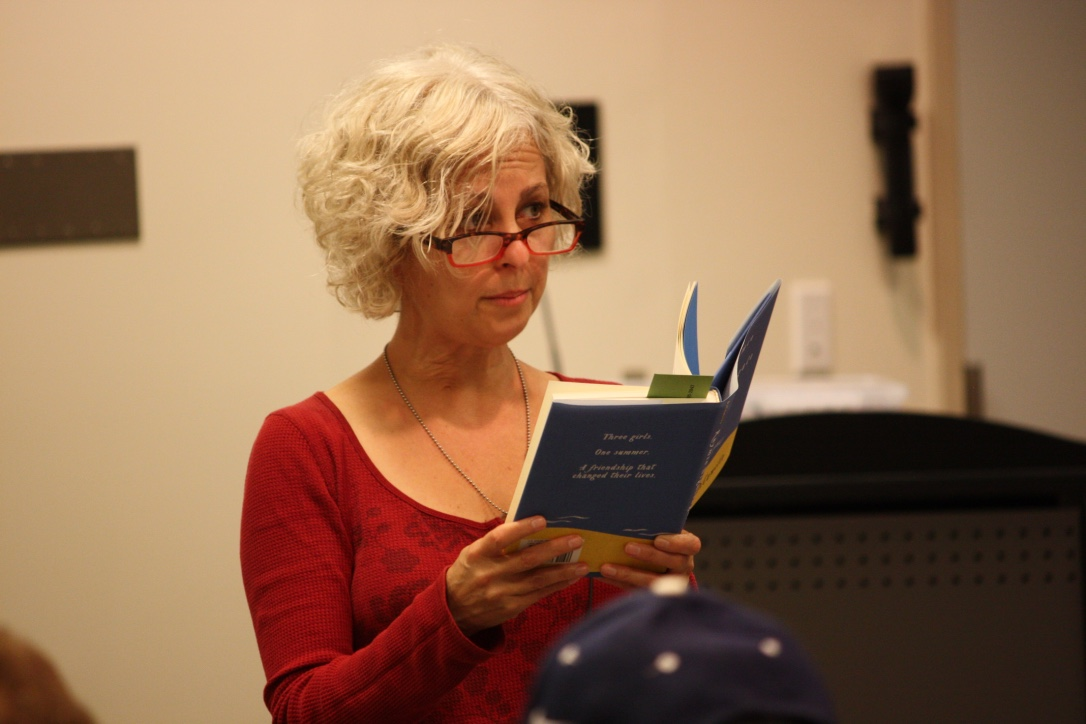Title of the work
Country of the First Edition
Country/countries of popularity
Original Language
First Edition Date
First Edition Details
Kate Di Camillo, K. G. Campbell, Flora and Ulysses: The Illuminated Adventures. Somerville, Mass: Candlewick Books, 2013, 234 pp.
ISBN
Official Website
katedicamillo.com (accessed: April 7, 2020)
Awards
2014 – Newbery Medal
Genre
Chapter book*
Novels
Target Audience
Children (Older children)
Cover

Retrieved from flickr.com, uploaded by School Library. Licensed under CC BY-NC-SA 2.0 (accessed: January 7, 2022).
Author of the Entry:
Elizabeth Hale, University of New England, ehale@une.edu.au
Peer-reviewer of the Entry:
Daniel A. Nkemleke, University of Yaoundé 1, nkemlekedan@yahoo.com
Elżbieta Olechowska, University of Warsaw, elzbieta.olechowska@gmail.com

Keith Gordon Campbell
, b. 1966
(Illustrator)
K. G. Campbell grew up in Kenya and was educated in Scotland. He studied Art History at the University of Edinburgh. After graduation, he worked as an interior designer in California, before returning to illustrating and writing full time. He lives in California.
Sources:
Official webiste (accessed: April 7, 2020).
Profile at kidscanpress.com (accessed: April 7, 2020).
Bio prepared by Elizabeth Hale, University of New England, ehale@une.edu.au

Retrieved from Wikipedia, public domain (accessed: January 7, 2022).
Kate DiCamillo
, b. 1964
(Author)
Kate DiCamillo was born in Philadelphia, and grew up in Florida. She studied English at the University of Florida (BA, 1987), and worked at Disney World, Circus World, before settling in Minneapolis, Minnesota and worked as a book distributor while beginning writing fiction. Her first novel, Because of Winn-Dixie (2000) was well received and she has continued a successful career as a writer, with works such as The Tale of Desperaux (2003) and The Miraculous Journey of Edward Tulane (2009) being adapted into films. She lives in Minneapolis.
Source:
Official webiste (accessed: April 7, 2020).
Bio prepared by Elizabeth Hale, University of New England, ehale@une.edu.au
Adaptations
Flora and Ulysses is in the process of being adapted into a movie. [Produced by Disney, to be streamed on Disney+, probably in 2020].
Translation
Into over 20 languages.
Summary
Flora Belle Buckman, aged ten, is a self-professed "cynic." The daughter of divorced parents, Phyllis (a romance novelist) and George (an accountant), she lives with her mother, and misses her father. She reads comics, including the Amazing Incandesto, a superhero comic, which she enjoys reading with her father. Looking out of her window one day, she sees her neighbour, Tootie Tickham, chasing a runaway vacuum cleaner, the Ulysses 2000, which swallows up a passing squirrel. Flora rushes to the squirrel’s rescue, giving it mouth-to-mouth resuscitation, and taking it home to recover. The squirrel, soon named Ulysses, is transformed by its accident, loving Flora deeply, and becoming a poet, inspired perhaps by a book of poetry belonging to Tootie, which has also been sucked up by the vacuum cleaner. Flora’s mother, Phyllis, dislikes Ulysses, believing him to be dirty and dangerous, and thus begins a battle of wits in which Phyllis tries to have Ulysses killed, and Flora works to rescue him. Along the way, Flora and Ulysses spend time with her father, George, a sad accountant who is devastated by the divorce and loss of time with his daughter. Ulysses, perpetually hungry, causes mayhem in a local doughnut shop, and narrowly escapes being killed by a knife-wielding chef. George takes Flora and Ulysses to his apartment building, where they face a fresh danger in the form of the landlord’s cat, and spend time with George’s neighbour, Dr Meescham. She is a philosopher from a country named Blundermeecen, and offers a number of philosophical insights into Flora’s situation and her relationship with her father. Flora begins to realise that her father loves her, and her cynicism starts to melt a little.
Meanwhile, Tootie Tickham has a visit from her great-nephew, William Spiver, who has been sent to stay by his mother, for an unspecified reason. William and Flora gradually become friends, talking about the meaning of life and the universe, and bonding over being children in divorced families. Eventually they band together to help save Ulysses from Phyllis. William claims to be blind, following a traumatic event – it emerges he had pushed his stepfather’s truck into a pond, and been banished from the house by his mother. The novel ends with William able to remove his dark glasses and see, and Flora, a cynic no longer, reconciled with her mother, and seated on Dr Meescham’s couch, surrounded by her parents and her new friends. She has hope for the future.
Analysis
This chapter book for young readers interweaves the anagnorisis, or journey of understanding, of the protagonist, Flora, with a family coming-of-age story that explores what it means to grow up, to be part of a "broken" family, and suggests ways of coping and reconciling. DiCamillo assembles a cast of unusual, "oddball" characters to do so – the cynical Flora, her novelist mother and accountant father, her bookworm neighbour Tootie and Tootie’s scientifically-minded nephew, William, and the philosopher, Dr Meescham. Ulysses, the squirrel, goes with them on an odyssey of intellectual and emotional growth. His adventures are simple domestic challenges involving cats, racoons, and mothers and chefs who don’t want animals in their kitchens. They take on additional meaning, because Ulysses’ life is continually at stake, and the novel takes on an epic quality because of the seriousness with which his view of the world is treated. Flora, too, has classical elements—her name puts her squarely in the tradition of associating children with nature – as the goddess of flowers, Flora has not yet blossomed, but as the novel progresses, and she reconciles with both her parents, and makes friends with the other characters, she blooms and grows.
The tone of the book is deliberately "wacky," and DiCamillo has an affection for the underdog – small, odd, or quirky characters who are having a difficult time in the world. This expresses itself in the poetic and philosophical reflections of different characters – moments such as Flora’s naming her squirrel Ulysses, the moments in which Ulysses writes poetry inspired both by his muse (Flora) and by the poetry he has incorporated into his being (mainly Rilke). The classicism of this book is lightly handled: it is not a main theme, but adds a literary depth to this novel, placing Flora and Ulysses’ adventures in a broader context of epic and heroic adventure.


